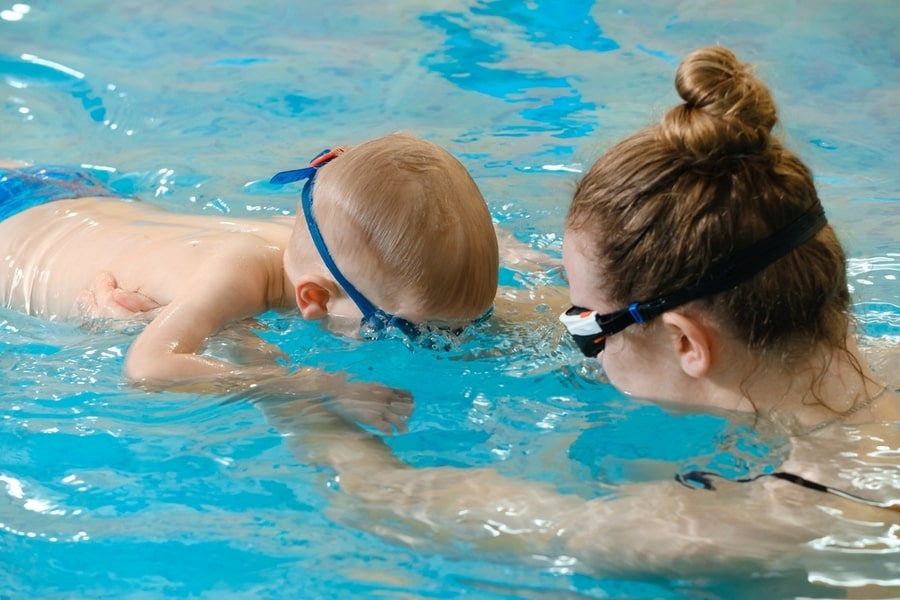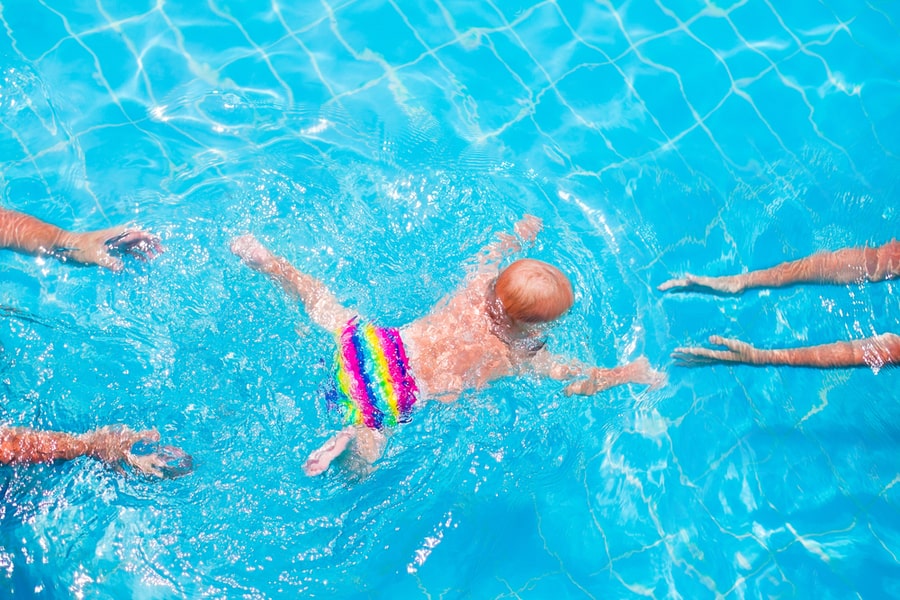Most parents know that it's important that their kids learn to swim, but many don't know when the right time is to start lessons. It is a common misconception that swimming is an activity that children can only learn when they are older. Some parents wait until their children are older, thinking that they will be better able to grasp the concept of swimming. In fact, swimming is a skill that can be taught at any age and starting early can have benefits for both children and parents.
At what age should you start swimming lessons for your kids?
It's a question many parents ask, and there is no one definitive answer. Some experts say as early as 3 months old, while others recommend waiting until the child is at least 3 years old. In order to assess your child's current swimming proficiency levels, swim schools like Fulton Swim School provide an assessment form that can be completed in 1-2 minutes. Ultimately, it depends on each individual child's development and readiness.
Here are a few things to consider when making the decision.
Fear of the water: Some small children are afraid of the water. If your child is hesitant or cries when near the pool, he or she might not be ready for swimming lessons. It's important to wait until your child is comfortable and confident in the water before starting swimming lessons.
Focus and attention span: Learning to swim requires focus and concentration. If your child has trouble sitting still or following instructions, swimming lessons might not be the right activity at this time. It might be better to wait a few months and try again when your child is a little older.
If you're still not sure whether swimming lessons are right for your child, talk to your paediatrician or another trusted healthcare provider. They can help you assess your child's development and readiness for swimming.
The advantages of swimming lessons for kids
Early swimming lessons may help your child grow physically and mentally, ensure their safety and acquire new skills that will last a lifetime. Here are a few benefits of starting your child's swimming lessons at a young age.
Learning survival skills: Formal swim lessons will give your kid the skills they need to survive if they fall into the water, ensuring they are prepared to act safely.
Physical development: Swimming keeps youngsters healthy and exercises essential parts of their physical development, such as lung and muscular health, flexibility, and stamina. It creates a solid basis for better health.
Fosters social abilities: In addition to physical development, swim classes enable your child to interact with other children their age and develop interpersonal skills. They could even meet some new pals since they share the same passion!
Respite from screen time: Swimming is the perfect way to get your kid involved in non-screen pastimes. Children now watch screens more often than ever. Overuse of screens is frequently associated with behavioural issues, sleep disorders, and sedentary lifestyles.
Courage to explore new interests: Swimming lessons may pique their curiosity about other water-related sports like competitive swimming, boating, scuba diving, and other activities.

Swimming lesson safety tips for children
Swimming lessons are an excellent way for children to stay active and have fun, but it's essential to ensure they stay safe. Here are some safety tips to keep in mind:
- Make sure an adult supervises the swimming area at all times.
- Children should only swim in areas that are appropriate for their skill level.
- Stay within arm's reach of your child at all times when they are swimming.
- Teach your child about swimming safety rules, such as not swimming alone and not going near the pool drain.
By following these safety tips, you can help ensure that your child has a fun and safe experience while learning to swim.
FAQ on swimming lessons for children
How do I know if my child is ready for swimming lessons?
If your child is interested in swimming and enjoys being in the water, they are likely ready for swimming lessons. It is also essential to make sure that your child is comfortable following instructions and able to focus for short periods.
What if my kid doesn't enjoy it?
Don't be concerned if you've started to expose your child to the water or have signed them up for swim classes and discovered they don't like it. You can do a few things to make the experience better for both of you and persuade them to perceive swimming differently.
Begin at home: Before enrolling your kid in a formal swim class or between classes, let them get used to water at home. The ideal moment to accustom them to water immersion is during bathtime. Blow bubbles or make little splashes to demonstrate how much fun they can have.
Let them observe others swimming: If your child is rejecting swim lessons due to fear or uncertainty, let them watch you or other kids their age having fun in the water. You may encourage your youngster to start thinking about swimming as a game rather than a skill to master or a challenge to conquer.
Make it enjoyable: Avoid letting your child's swim lessons become a cause of anxiety or tension for you. Make it a joyful and exciting time by implementing prizes, goals, and activities. Pool games are excellent motivators and unwittingly teach your youngster how to float, kick, and tread water. You could also explore using a range of toys and things that will make swimming sessions more exciting.
Create a routine: Acquiring a new skill requires repetition, which is crucial. Include consistent swimming lessons in your child's weekly schedule. Giving them something to anticipate and an opportunity to keep improving their skills over time will make them feel more positive.
What should I look for in a swimming lesson program?
Swimming is an excellent way for kids to stay active and have fun, and with the right swimming lesson program, they can learn essential skills that will last a lifetime. When choosing a swimming lesson program for your child, it is crucial to ensure that the instructors are certified and have experience teaching young children. The classes should also be small, so each child gets individual attention. Choosing a program that progresses gradually so your child can build their skills and confidence at their own pace is also a good idea.
Once enrolled in swim lessons, what's the best approach to learn?
You may be debating which is better: a brief weekly lesson or summer school programmes, in which the child attends a swim class daily for a week or two. The answer may vary depending on your family's routine and what is offered in your location, but even if you choose intensives during the holidays, try to give your child the opportunity to frequently exercise the skills they have acquired in the pool.

Why choose Fulton Swim School for swimming lessons for your child?
Fulton Swim School offers a range of swimming lessons to suit all levels. Whether your child is a complete beginner or looking to hone their swimming skills, our experienced and qualified instructors will provide them with the support and guidance they need.
Babies from 3 months to children 3 years old can enrol in our Jellyfish, Nemos, Wiggles, and Sprats Lessons at Fulton Swim School to begin enjoying and becoming accustomed to the water and for introductions to swimming fundamentals.
We also offer several different class types so that you can choose the best option for your child's individual needs. With small class sizes and a focus on safety and enjoyment, swimming with Fulton Swim School is an enjoyable and rewarding experience for the whole family.
Browse our swimming lessons in Botany, New Plymouth, Upper Hutt, Patumahoe, Puni and Papamoa. See you at the pool!
